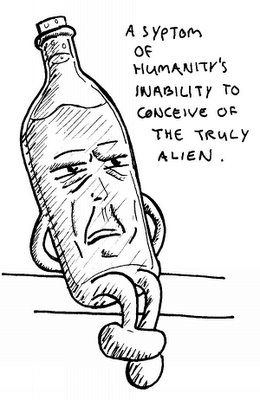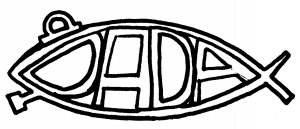Kthaahthikha
13 February, 2006
 As best demonstrated by The Discovery Channel's Alien Planet. Wayne Barlowe, on whose book it was based, was apparently holding himself back. It wasn't until the Amoebic Sea came along that we the viewers were allowed a glimpse of just how marvelous this programme could have been. It was mostly just riffing on dinosaurs, which looks great in paintings but less so in cheap CGI, when the more fantastic the image, the more realistic it appears.
As best demonstrated by The Discovery Channel's Alien Planet. Wayne Barlowe, on whose book it was based, was apparently holding himself back. It wasn't until the Amoebic Sea came along that we the viewers were allowed a glimpse of just how marvelous this programme could have been. It was mostly just riffing on dinosaurs, which looks great in paintings but less so in cheap CGI, when the more fantastic the image, the more realistic it appears.Lookit:

12 February, 2006
The Big Tissues

I am torn about global warming. On the one (cold, impersonal, detached and pseudo-scientific) hand, it's ultimately immaterial because we could blast the earth with nuclear bombs and, in a few million years, we'd have a flourishing ecosystem once more (albeit a radically different one). I'm also confident enough in human ingeuity that I'm sure we could pretty much survive anything we managed to come-up with, even if it meant genetically modifying ourselves and living in vast subterranean arcologies. There's also the fact that change is a natural part of the enviroment - even radical change. The Permian and KT extinctions allowed for entirely new and wonderful developments (including humanity's own) at the unfortunate expense of other creatures.
There's also the question of what we're worried about happening. Our species is pretty resilient, and we are all ultimately going to die anyway. Individually. If we all just stopped reproducing right now and the remaining humans died of old age, it would not matter one bar because we'd have all lived a long and full life. The same thing goes for all the other animals on the planet. I'm more worried about things arising from climate change, like wars and diseases and over-crowding - a drop in the quality of life more than the quantity. The extinction of species doesn't actually matter, as it seems to be more important what happens to the individual during life.
However, that's the cool-headed and detached side of me. The side with lots of emotions is worried because it doesn't want all the lovely animals driven to extinction, even if they will be replaced by new and fancier variations and possibly entirely new hierarchies of dominance ( a second age of insects, or an age of birds, or a completely novel branch of the animals kingdom like warm-blooded moluscs or something). I don't want the world to become smog-ridden and Gibsonesque because even if other organisms adapt to it and find it pleasant and normal (and I know we could do the same using science) I would find it weird and different and a complete change from what has come before.
I am also confused about attempts to halt natural environmental change. Two years ago I worked as part of an environmental initiative on the Victorian coast, working to revegeate dunes and fight the spread of weeds. However, upon inquiry I discovered that many of the weeds had been brought into the area by native birdlife, and that some of the beaches (though certainly not all) were eroding due to the natural way of the sea and not because of humanity's tinkering. So, in affect, we were attempting to freeze the environment at its current level and halt the forces of natural development and struggle, forcing the Victorian coastal ecology into a form of perpetual stasis. We also did a lot of good work combatting human harm, but humans are a part of nature, and part of nature is new animals coming in and screwing things up so that everything changes. Like humans are doing.
Of course following that path to its logical extreme would probably result in promoting an anarchist philosophy in relation to all actions, so I'm not sure, but I do think that we are a catalyst, and that it is ridiculous to try and apply the standards of good and evil to something as complex and impersonal as nature.
I should also add that my greatest concern is sustainability.
And so ends my lengthy, poorly-considered and self-contradictory ramble. If I read through that I would probably disagree with myself on several points.
10 February, 2006
Froobs and handvers
Having received his slip in the post, Joseph took it inside and sat the envelope (within which the slip was contained) upon the mantelpiece.
His brother, William, with whom Joseph shared the small chambers, regarded the envelope with a great deal of curiosity. It was addressed to his brother, an ordinary envelope, with the sender listed as “Samuel K. Dawson, of
‘Aren’t you going to open it?’ asked William, when he and his brother were seated in the lounge room, reading before the landlady called for dinner.
‘No,’ Joseph replied.
‘But your fate is contained within that envelope’, said William.
‘I know,’ said Joseph. ‘But it is, ultimately, immaterial.’
‘Your fate is immaterial?’ asked William. ‘But, should you know it, you will be prepared, you might act on it. Think of what you might do armed with your fate.’
‘I might do nothing,’ Joseph replied, ‘for if I am fated to something then that is to say that it is inevitable – no amount of foreknowledge could make it any more or less so. Ultimately, the contents of that envelope are immaterial.’
William sat quietly in his chair, regarding Joseph. He could not argue – or at least, not with that particular sentiment. It was true. However, William was a man who had often liked to question things; even as his brother was blessed with an unmatched capacity for acceptance, William had been driven since birth by a curiosity and refusal to submit.
‘Have you considered,’ he asked, having thought a few moments, ‘that, even as the slip of card tells you the means of your death, it requires your action in facilitating your fate. It’s all well and good to say that you are bound to the slip, but how do you know that it isn’t only by refusing to open the envelope that you die by the means it suggests. If you were to open the envelope, it might tell you that you were killed by a sniper hired by a jealous husband, even as you sat right now in that very chair. But if you were to rise and walk to the mantel and read the card, the bullet might miss you, and you would find the contents of the card to be useless.’
‘If I were to get up and read the card right now and so escape a bullet, then the writing on the card would not read “death by the bullet of a jealous husband’s assassin”. Or, if it should, it would not be referring to a bullet at this time. Or else the sniper might adjust his aim and shoot me as I read the card.’
‘You say that the card would not read as such,’ said William, ‘if you were to rise and read it now. However, what if the card is mutable? What if, by refusing to read it, the card has printed upon it “death by the bullet of a jealous husband’s assassin’, but, if you were to rise and read it, the card should say something else entirely - “food poisoning”, or “the dart of a
‘There’s no way to know that,’ said Joseph. ‘You are suggesting an unscientific hypothesis.’
‘But it begs the question,’ William said, ‘of whether there is anything written on the card at all. Isn’t it possible that there is nothing written on it? That it is only by setting eyes upon it that a choice is taken – like dice endlessly rolling until someone stops them.’
‘By your reckoning,’ said Joseph, ‘it is only the knowledge of one’s fate that cements it – in which case, it is only further proof that I should avoid reading the card.’
‘But not because your fate is set in stone,’ William said. ‘You should avoid reading the card for the very fact that your fate is in a constant state of flux. I agree wholeheartedly, brother. Keep the envelope sealed at all times, and you’ll be free of fate entirely. The absence of knowledge of one’s fate is just as good as the absence of fate, for it renders fate immaterial.’
‘I’m not sure that I agree with you,’ Joseph said. ‘I believe that there is a predetermined fate in the universe. The existence of the cards – the thousands of people in this city alone who have died according to the cards’ predictions – proves that there is a predetermined fate.’
‘It only proves that people died in accordance with the cards,’ William countered. ‘There is nothing to say that, had they never opened them, they would have died the same way.’
‘But what of the famous incident of the man who left his card at the hospital by mistake, and was killed by a train, only to have the receptionist mistake the card for a letter and read of the poor soul’s fate?’
‘This proves nothing,’ said William. ‘If the envelope had never been opened, then who’s to say what the mode of death would have been?’
Joseph rose.
‘I am uncertain,’ he said, ‘that I agree with you. I would like you to please sit there as I open the card and read it, and we shall find-out what it says, if only to settle this debate once and for all.’
‘It won’t prove anything,’ William said. ‘Brother, should you read that card you will only be setting your fate in stone. Leave it alone and you might live a peaceful life.’
‘But it doesn’t matter,’ Joseph said. ‘Should I read the card, I might die of tuberculosis. Should I leave the card be, I might be struck by lightning or knocked-down in traffic. Whether I die by the card or by random chance – whether I die by either – has absolutely no impact upon me, for the simple fact is that I will die, and that the knowledge contained within this card will not help me, and the absence of that knowledge will not help me either.’
William fumed, hunched in is chair, staring at his brother where he stood by the fire, the envelope in his hands and a thumb under one of the flaps.
‘I don’t see why you’re so concerned,’ said Joseph. ‘I’ll gain more by reading it than by leaving it locked away – I’ll have peace of mind, on the one hand, and a vague idea of the safe areas in my life.’
Joseph ripped the envelope open and removed the card. He read it. One of his eyebrows rose.
‘It’s blank,’ Joseph said. William began to rise to investigate. Joseph laughed. ‘I’m lying,’ he said. ‘It reads “blood infection”. It’s very vague.”
Joseph sat back down in his chair.
‘All this has proved,’ he said to his brother in a reproachful voice, ‘is that I’m mortal. I don’t see the point of trying to fight something inevitable. You should learn to accept things more easily.’
‘I suppose,’ said William, a bitter look on his face, although inside he grinned at how clever he had been.


